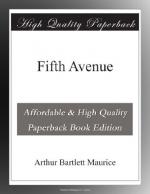The first home of the Century, which it occupied for two years, was in rooms at 495 Broadway—between Broome and Spring Streets. During this period a journal called the “Century” was started, and edited by F.S. Cozzens and John H. Gourley. Then, in 1848, the club moved to 435 Broome Street; thence, in 1850, to 575 Broadway; in 1852, to Clinton Place, where Thackeray learned to love it, and where, by virtue of proximity, it first laid claim to be regarded as a Fifth Avenue club.
[Illustration: WHERE THE AVENUE AND THIRTY-FOURTH STREET CROSS STANDS THE BUILDING POPULARLY KNOWN AS THE KNICKERBOCKER TRUST COMPANY. HERE, IN THE MIDDLE OF THE LAST CENTURY, “SARSAPARILLA” TOWNSEND BUILT IN BROWN-STONE, AND A.T. STEWART LATER BUILT IN WHITE MARBLE]
In Clinton Place the Century stayed until it went to its Fifteenth Street house, where it was so long to remain. Gulian Verplanck’s presidency lasted for many years. At first it was a happy tenure of office. But the Civil War came, bringing with it grave dissensions. Verplanck may be said to have invited the divisions that crept into the club, and which led to his overwhelming defeat in the election of 1864. He was succeeded by the historian Bancroft, who held office until 1868, when he resigned because of his departure for Prussia as the United States Minister to Berlin.
From the very day when it took form the Century seems to have had an atmosphere—almost a history. In the years long before the more modern clubs of a literary flavour were dreamed of, the Century was bringing together the leading men-of-letters and of art of New York. Yet somehow the Century of early times impresses newer generations as having been tremendously portentous and dignified. There was never any suggestion of Bohemia. After the establishment of the Century the gifted Poe was to enjoy, or rather to endure, two more years of life. By no stretch of the imagination can we think of his being in the club, even as the guest of an evening. There was plenty of good-fellowship, no doubt, and good cheer, but also the chill of a certain reserve. The talk seems, after all the years, to have been essentially serious—men expressing themselves not lightly, but judicially, and after long deliberation; Mr. Bryant gravely conceding the right of Pope or Dryden or Watts, according to the subject of discussion, to be ranked as a poet, or denying the same, while members of lesser note sat about listening and nodding, but preserving becoming reticence. There was




